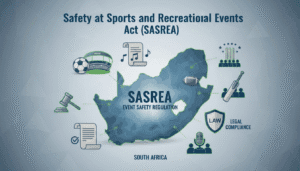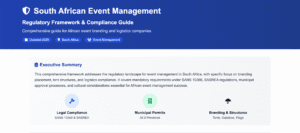Pulling off a successful corporate event can feel like navigating through a maze. Indeed, studies show that corporate events are crucial for employee engagement and business growth.
This blog unfolds the art of managing such events effortlessly, from setting objectives to measuring success. Ready to throw an event your attendees won’t forget? Keep reading!
Key Takeaways
- Corporate events come in various types, including business conferences, professional seminars, product unveilings, and employee appreciation events.
- Setting clear goals and objectives is crucial for successful corporate event planning. These targets should be specific, measurable, attainable, relevant, and time-bound (SMART).
- Identifying the target audience through demographic analysis helps in creating compelling content that meets their needs and problems.
- Effective execution of corporate events requires attention to detail in every aspect, from budget management to attendee satisfaction.
The Importance of Corporate Event Planning

Corporate event planning is crucial for businesses as it involves setting goals, identifying target audiences, and effectively engaging stakeholders through various types of events such as conferences, seminars, teambuilding activities, and trade shows. By meticulously organizing these events, companies can enhance brand awareness, foster relationships, and drive innovation within their teams. To achieve successful outcomes, businesses can follow expert tips for memorable corporate events, which involve careful planning and attention to detail. Additionally, utilizing feedback from past events can lead to continuous improvement and greater attendee satisfaction.
Types of corporate events
Corporate events come in a wide range of formats, each serving a distinct purpose aligned with the company’s strategic objectives. Below are the various types of corporate events that businesses commonly organise: These events can include conferences, product launches, team-building activities, and networking sessions, all designed to foster relationships and drive engagement. Effective planning and execution are crucial, as they can directly impact brand perception and client retention. Incorporating robust marketing strategies for corporate events can significantly enhance visibility and ensure a higher rate of participation. Additionally, as the landscape of corporate gatherings evolves, many organizations are increasingly focusing on organizing corporate hybrid events that combine in-person and virtual participation. This approach not only broadens the audience reach but also accommodates varying preferences, ensuring inclusivity. By leveraging technology effectively, companies can create engaging experiences that resonate with both live attendees and remote participants, thereby enhancing overall event success.
- Business Conferences: These large-scale events involve employees, industry leaders, and key stakeholders discussing business trends and strategies.
- Professional Seminars: These educational events typically feature an expert speaker talking about a specific topic related to the industry or field.
- Product Unveiling: Businesses hold these events to launch new products or services, primarily attracting media attention and industry influencers.
- Exhibition Events: These entail showcasing a company’s products or services at trade shows or exhibitions to attract potential clients and investors.
- Teambuilding Activities: Companies use these events to strengthen relationships among employees, fostering teamwork and improving overall productivity.
- Corporate Dinners: Often organised to celebrate achievements or milestones, these formal events serve as opportunities for networking and recognising employees’ hard work.
- Golf Tournaments: Businesses frequently sponsor such contests as an informal setting for networking with customers, clients, or partners in a relaxed environment.
- Employee Appreciation Events: Organisations host these events to acknowledge and reward employees’ efforts and contributions towards achieving business goals.
- Client Networking Events: These gatherings provide a platform for companies to connect with clients on a more personal level, often leading to stronger business relationships.
- Corporate Retreats: This type of event is designed for executives and teams within companies to focus on long-term strategic planning in an offsite location away from typical workplace distractions.
Setting goals and objectives
Event planners establish goals and objectives to guide the planning process of corporate events. A goal could involve growing revenue or improving customer service. Targets need to be specific, measurable, attainable, relevant and time-bound (SMART).
These SMART objectives contribute significantly towards company success.
Aligning event targets with broader company objectives is a strategic move in corporate event management. For instance, an organisation aiming for operational efficiency might organise a training seminar.
In this context, pre-determining values and priorities act as pillars upon which successful events are built. Utilising an event management system can help streamline operations while keeping sight of these set objectives.
Identifying target audience
Efficient corporate event planning requires proper identification of the target audience. This involves comprehensive demographic analysis and detailed attendee profiling. Understanding the ideal audience, whether they are marketing managers or executive assistants, aids in inviting individuals most relevant to your event.
A crucial component of attracting this intended group is creating compelling content that addresses their specific needs and problems. Gathering data about potential attendees employs various market research techniques, making the process more effective and streamlined.
An apt understanding of your target demographic can significantly boost attendee engagement, transforming your event into a success story right from its promotion stage all through to execution.
Excellence in Event Management: Your Guide to Successful Planning

Mastering the art of corporate event management requires strategic planning and organization. Attention to detail encompasses every aspect, from meticulous budget management to ensuring attendee satisfaction. Implementing effective communication channels is essential to keep all stakeholders informed and engaged throughout the planning process. Additionally, mastering event management techniques can significantly enhance the overall quality and success of the event. By consistently evaluating and adapting strategies based on feedback and outcomes, event managers can foster a culture of continuous improvement.
It is vital to consider various factors such as event logistics, which cover everything from venue procurement to day-of operations.
Effective execution means that each stage of the process is handled with precision and efficiency including pre-event tasks, carrying out activities on the day itself and post-event duties like feedback collection.
Using feedback assessments can highlight areas for improvement in future events.
Organizational skills play a significant role in event success evaluation. Coordinating an excellent corporate event involves implementing these skills at every phase; only then will one truly excel in this challenging yet rewarding field of work.
Planning and Budgeting for Corporate Events
Establishing a realistic budget is crucial to the success of corporate events.
Establishing a realistic budget
A successful corporate event begins with detailed financial planning. Developing a realistic budget not only guides the allocation of resources but also paints a vivid picture of expected expenses and potential income.
A well-structured budget throws light on all conceivable costs, thus preventing any unpleasant surprises down the line.
Sticking to the principal rule of never underestimating expenses, guarantees transparency and helps manage spending efficiently. Deploying competent budgeting software can assist in maintaining cost controls while providing accurate project feasibility analysis.
Expense tracking becomes effortless whilst financial forecasting leads to improved decision making for future events.
Choosing the Right Venue
Consider accessibility and amenities when selecting the venue for your corporate event.
Considering accessibility and amenities
Ease of accessibility is crucial when selecting a venue for corporate events. Wheelchair accessible entrances and special needs accommodations play major roles in ensuring all attendees can participate without inconvenience.
Transport connections count too, with proximity to airports and transportation hubs significantly increasing the convenience factor for guests travelling from afar. Furthermore, it’s essential to verify whether the venue has kitchen facilities or catering support if food service forms part of your event program.
Finally, make sure the capacity matches your guest list numbers while the available layout options align with your event setup needs.
Virtual event planning options
Virtual event planning options provide an innovative solution for corporate events, enabling companies to engage audiences without geographical constraints. The surge in remote work has brought about a shift towards digital conference planning and online corporate event management. To maximize impact, companies can implement effective strategies for virtual events, ensuring that their messaging resonates with participants. Incorporating interactive elements, such as live polls and Q&A sessions, can further enhance engagement and keep attendees invested. Ultimately, this evolution in event planning fosters a more inclusive environment, allowing diverse audiences to connect and collaborate seamlessly.
Selecting a virtual venue involves more than just choosing a platform; it also includes considering its features, accessibility, and capacity which all contribute to the seamless organisation of your webinars or virtual gatherings.
Advanced tools even offer immersive experiences with 3D environments that mimic physical venues. Hence, whether you’re arranging a small business meeting or large-scale seminar, there’s an array of online platforms available that ensure your event delivers maximum impact.
Ensuring Smooth Execution
Pre-event planning involves coordinating logistics, such as speakers, catering, and audiovisual requirements.
Pre-event planning
Pre-event planning is a crucial step in ensuring the success of corporate events. This involves several important tasks and considerations, including:
- Creating a realistic budget to allocate funds for all necessary expenses.
- Selecting the right venue that meets the needs of the event, considering factors such as accessibility and amenities.
- Securing sponsors or partners who can provide financial support or contribute resources to enhance the event.
- Determining the ideal date and time for the event, taking into account any scheduling conflicts or competing events.
- Developing a comprehensive timeline that outlines all pre-event planning tasks, event execution activities, and post-event follow-up actions.
- Building a guest list that includes the target audience for the event and extends invitations accordingly.
- Managing event logistics, such as transportation, accommodation, and catering services.
- Incorporating technology solutions to streamline event registration, communication, and organization.
Event day logistics
Event day logistics is a crucial aspect of managing corporate events. It involves the seamless coordination and execution of various tasks to ensure a successful event. Here’s what you need to consider for effective event day logistics:
- Arranging transportation for attendees, ensuring easy accessibility to the venue.
- Coordinating with vendors and suppliers to ensure all necessary equipment and materials are delivered on time.
- Setting up registration and check – in processes to smoothly manage attendee arrival.
- Ensuring proper signage and directions are in place to guide attendees throughout the venue.
- Conducting thorough technical checks before the event starts to avoid any technical glitches during presentations or performances.
- Coordinating with venue staff for catering services, ensuring a smooth dining experience for attendees.
- Having a dedicated team equipped with walkie-talkies or other communication devices for efficient on-site coordination.
- Providing adequate security measures to ensure the safety of attendees and protect valuable assets.
- Offering technical support services throughout the event, promptly addressing any audiovisual or IT – related issues.
Utilizing technology
Implementing technology is crucial for ensuring smooth execution in managing corporate events. By utilizing event management software, such as QuickFMS, organizers can streamline various processes and improve overall efficiency.
This technological solution allows for seamless registration, attendee management, and communication throughout the event. Additionally, business process automation (BPA) plays a significant role in reducing complexity and cost while improving efficiency.
With the use of technology, organizers can meet attendee expectations by providing detailed information and incorporating feedback for future improvement. Ultimately, leveraging technology enables event planners to optimize their operations and deliver successful corporate events.
Measuring Success and Career Opportunities
Evaluate the impact of your corporate event, explore career possibilities in event management and discover the necessary skills and qualifications – all in this insightful blog post.
Read on to find out more.
Post-event follow-up
Post-event follow-up is a crucial step in measuring the success of corporate events and exploring career opportunities in event management. Evaluating the event’s impact allows you to assess its effectiveness, identify areas for improvement, and gather valuable feedback from participants.
By conducting post-event surveys and meetings, you can measure event marketing strategies, networking opportunities, and overall attendee satisfaction. This data helps inform future planning decisions and enhances your ability to develop successful events that achieve their goals.
Additionally, analyzing post-event feedback enables you to enhance your skills as an event manager and opens doors for career advancement within the industry.
Career possibilities in event management
- Event managers have a range of career opportunities in the field of event management.
- They can work as event managers, coordinators, planners, or organizers.
- Experience and specialized skills are important for success in this industry.
- Event management is a growing business with ample career prospects.
- Luxury events are another area where event managers can find career opportunities.
- Both degree holders and those with relevant experience can pursue careers in event management.
- Event planning is considered one of the most stressful jobs but offers rewarding career options.
- The event industry has seen significant growth, creating more job opportunities.
- A degree in event management can enhance chances of securing higher – level positions.
Necessary skills and qualifications
Event managers require a variety of skills and qualifications to ensure the success of corporate events. Fundamental qualities such as motivation, enthusiasm, and ambition are essential for those in the field.
It is also crucial to have strong business acumen to understand the objectives and goals of each event. Furthermore, leadership skills are necessary when coordinating team efforts and delegating tasks effectively.
Excellent communication skills play a vital role in interacting with stakeholders, while analytical abilities enable efficient decision-making throughout the planning process. Furthermore, event managers must possess teamwork skills to collaborate effectively with colleagues and adaptability when faced with unexpected challenges.
Conclusion
In conclusion, managing corporate events requires careful planning and execution to create memorable experiences for participants. By setting clear goals, identifying the target audience, and ensuring smooth logistics, businesses can achieve their objectives and strengthen relationships with both employees and clients.
With attention to detail and effective coordination, successful corporate events can enhance engagement and contribute to the overall success of a company.
What Are Some Effective Event Promotion Strategies for Corporate Events?
When planning corporate events, using effective event promotion strategies is crucial for success. Utilize social media platforms to create buzz around your event, target relevant audiences, and share engaging content. Collaborate with influential industry leaders to boost visibility and credibility. Leverage email marketing campaigns to reach out to your target audience directly. Lastly, offer exclusive incentives or discounts to encourage early bird registrations.
FAQs
1. What is involved in managing a corporate event?
Managing a corporate event involves tasks such as planning the agenda, coordinating logistics, securing venues and vendors, arranging accommodations, and overseeing all aspects of the event to ensure its success.
2. How far in advance should I start planning for a corporate event?
It’s recommended to start planning for a corporate event at least six months ahead of time to allow ample time for venue selection, vendor contracts, attendee invitations, and other necessary arrangements.
3. What skills are important for successful corporate event management?
Successful corporate event management requires strong organizational skills, attention to detail, effective communication abilities, budgeting expertise, problem-solving capabilities, and the ability to handle multiple tasks simultaneously.
4. How do I create an engaging program for my corporate event?
To create an engaging program for your corporate event, consider incorporating interactive sessions like workshops or panel discussions with industry experts; include networking opportunities; plan unique activities or team-building exercises; and incorporate elements that align with the goals of your organization or theme of the event.
5. How can I ensure smooth execution during a corporate event?
Ensuring smooth execution during a corporate event involves having a detailed timeline with clear responsibilities assigned to team members; conducting thorough rehearsals if applicable; providing clear instructions to staff and volunteers; maintaining open lines of communication throughout the day; and being prepared with contingency plans for any unforeseen circumstances that may arise.




